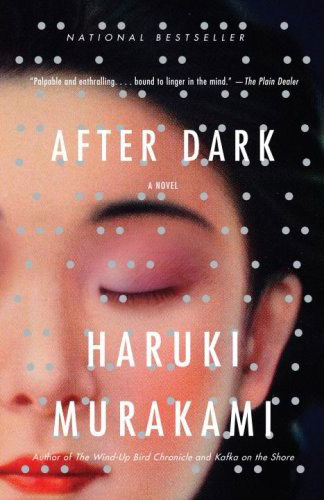
Title: After Dark
Author: Haruki Murakami
Translator: Jay Rubin
(USA) Publisher: Knopf
(USA) Release Date: May, 2007
Synopsis
After Dark is, in some ways, typical Murakami. It’s a slice of life story which incorporates a bit of the bizarre, a weaving together of characters who would, in any other circumstance, never meet, and an over-arching feeling of alienation and melancholy. The story follows several different characters, but probably most prominently featured is Mari, a young 19-year-old girl who has decided she is going to spend the entire night reading at a Denny’s rather than return home. Mari in turn meets Takahashi, who claims he knows not only Mari but her sister Eri as well, and has hung out with them before when they were a bit younger.
As the story progresses Takahashi introduces Mari to a friend of his, Kaoru, a large-muscled woman who used to be a female wrestler and now manages a Tokyo love hotel. It turns out that Kaoru needs Mari’s assistance when a Chinese prostitute is badly beaten and Kaoru doesn’t speak a word of Chinese, a language that Mari is near fluent in.
Meanwhile, the story has been going between Mari’s rather strange serious of acquaintances back and for to her sister Eri. Eri has been sleeping for a long time and barely gets up to take care of what must necessarily be done to stay alive. She sleeps almost without moving and to avoid having to interact with people. However, what she doesn’t know is that she is being watched (by none other than the man who beat up the Chinese prostitute).
Review
I really have to end my synopsis there. It’s almost impossible to write a synopsis of a Murakami book in such a way that would convince other people to read it. I absolutely love his work, but trying to explain why I love it, or even what happened in it isn’t the easiest thing ever. As my synopsis began, in many ways this is typical Murakami, but there are some new elements in it as well.
The typical elements are the themes, subjects, and even its dreamlike qualities. Much like when the main character of his Wind-Up Bird Chronicle goes down an empty well to experience pure “aloneness,” Eri closes herself off in a world of dreams and sleep, and Mari closes herself off in the night and her books. However, Mari is forced into interaction and eventually into confronting her issues with her sister through outside forces. While sometimes morose and lonely, there is always that feeling that someone is trying to reach out through the walls you have built around yourself. Murakami’s books highlight modern feelings of isolation in a world where we are continuously connected by the Internet and cell phones.
Murakami’s characters, at least in my experience and opinion, usually feel like blank slates. The story is usually told in the first person through their eyes, so as far as the main character goes the reader can project onto them their own thoughts or feelings, views and outlooks, and even appearances and quirks. After Dark, however, is told from the third person, and even going further than that by breaking the fourth wall and narrating with the term “we.” We see the action along with the narrator, as if through a camera watching their every move. If you want moving characters, or characters you can really relate to, I don’t know if Murakami ever really delivers there, but he certainly doesn’t here. The most likable characters in my opinion are Takahashi and Kaoru and that is because they were fleshed out a little more.
What I most love about Murakami is his style. Perhaps it’s because I view his books from a Western perspective and he is a Japanese writer, but that can’t be it because Western influences seem to always dot his pages. Western music also plays a role in many of Murakami’s works, including and not limited to Norwegian Wood (named after the Beatles song) and in After Dark as well. The influence of music is a little less obvious — it’s the song playing in the background of Denny’s or heard from car stereos — but After Dark certainly has its own soundtrack which is an interesting addition.
Overall, I enjoyed After Dark. It is not nearly as memorable as Kafka on the Shore or as lonely as Norwegian Wood, but it stands out for its own reasons. There really isn’t much of a plot to speak of; it is exactly as though someone had taken a real slice of life and didn’t try to make it more than it was or less than it was. While the dreamy quality exists when the story focuses on Eri, this is Murakami — there has to be a bit of the off-kilter and not-quite-right. Being a self-proclaimed Murakami fangirl, I wanted to love this, but I still can only give it a B-. It was a fair enough helping to last me until his next novel, whenever that happens and is translated. I don’t think this is the book you’d want to introduce someone to the author with, but rather let them discover it on their own after becoming acquainted with his style.






